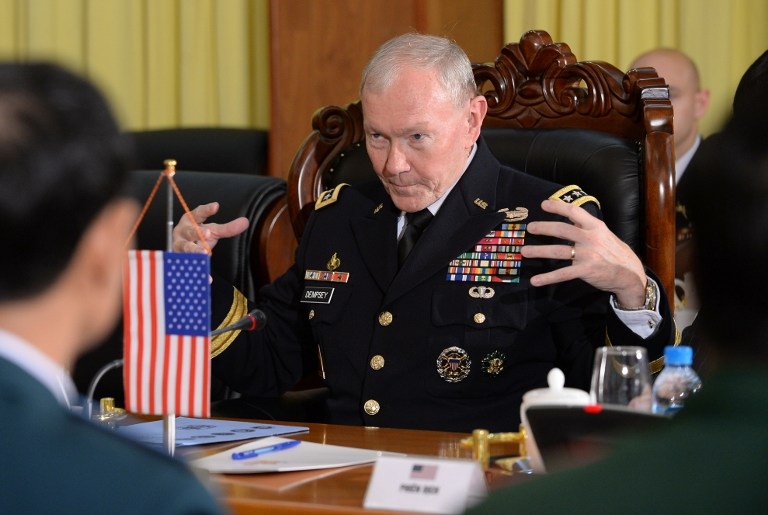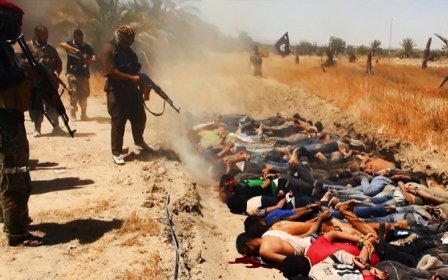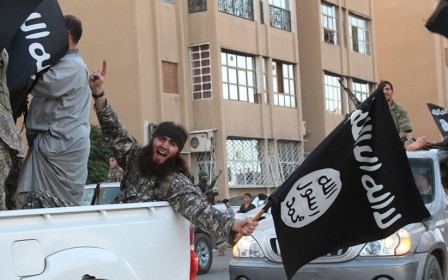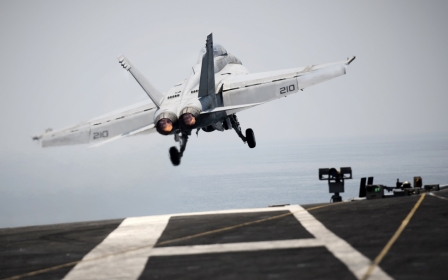US more focused on fighting IS than ending Syria crisis

While the US has considerably stepped up its targeting of IS militants in Iraq, international engagement with the unfolding situation in Syria has significantly withdrawn over the past few months, global observers have said.
The death toll from the war in Syria has topped 191,000, UN rights chief Navi Pillay said Friday, criticising "international paralysis" on the conflict where militants have established a foothold.
Pillay said the 191,369 deaths recorded between March 2011 when the war broke out and April this year, was nearly double that given a year ago, and was likely an underestimate.
Pillay's comments came as a monitoring group reported that at least 70 Islamic State fighters had been killed in 48 hours of clashes with Syrian army troops in the northern province of Raqa.
IS military gains in Raqa and Aleppo provinces have prompted the Syrian government for the first time to launch intensive air strikes against the militants who have seized large swathes of territory straddling Syria and Iraq.
Pillay, who Thursday chided the UN Security Council for what she called a lack of resolve in ending crises, said in a statement the dwindling global interest in Syria was "scandalous".
"The killers, destroyers and torturers in Syria have been empowered and emboldened by the international paralysis," added the outgoing head of the UN High Commissioner for Human Rights.
Equally disappointed with international engagement on Syria, Human Rights Watch said Thursday that hundreds of victims of a chemical weapons attack in Syria remained without justice one year on.
Thursday was the first anniversary of the chemical attack on the capital's Ghouta region, a stronghold of the rebel movement, which the United States estimated killed up to 1,400 people.
On Monday, US President Barack Obama hailed the completion of the destruction, which was carried out aboard a US Navy ship in the Mediterranean.
"Closure of the chemical weapons issue in Syria will be possible only when those who ordered and executed the Ghouta attacks have been held to account and are behind bars,",said Nadim Houry, Deputy Middle East and North Africa Director at HRW.
"International efforts to ensure credible justice for these and other ongoing grave human rights crimes in Syria have proved elusive," the New York-based body added.
Analysts say that while the situation in Syria remains unresolved, a lot has been done by the US and other international actors to try and resolve the crisis.
“There has been a great deal done but not enough to end it [the crisis in Syria] and the fundamental reason is because there are combatants that have irreconcilable ambitions,” said Shashank Joshi, research fellow at the Royal United Service Institute RUSI.
“The situation has not been helped by the Syrian government’s allies, like Russia and Iran, refusing to put significant pressure on the regime to make concessions,” he added.
“There isn’t a day that goes by where US officials are not addressing the situation in Syria. People see how horrible the Assad regime has been to its own people; they also how horrible IS and other extremists have been,” Brian Katulis, senior fellow at the Centre for American Progress, told MEE.
US offensive on IS
Meanwhile, US generals called for the US military to take action against IS militants not only in Iraq, but in Syria as well.
US military must take decisive action to "destroy" Islamic extremists in both Iraq and Syria before the threat from militants expands, a former American general said on Thursday.
Only the United States has the power and weaponry to lead a coalition - including local Iraqi, Kurdish and tribal forces - to confront the Islamic State (IS), said retired four-star general John Allen, who led US troops in Iraq and served as the top commander in Afghanistan.
"The Islamic State is an entity beyond the pale of humanity and it must be eradicated. If we delay now, we will pay later," Allen wrote in a commentary in Defense One.
The former commander said the grisly execution of US reporter James Foley by the militants "brings home to us all what this group represents."
Allen praised President Barack Obama for his response so far, including limited air raids against the militants in northern Iraq, but argued that strikes against the militants should not be confined to Iraq but should apply to western Syria as well.
"We cannot leave IS a safe haven anywhere or a secure support platform from which to regroup or enjoy sanctuary across the now-irrelevant frontier between Syria and Iraq," he wrote.
"Syria is a failed state neither capable of acting as a sovereign entity nor deserving the respect of one," he wrote.
Allen did not advocate deploying a large contingent of US ground troops and instead backed the use of American air power in support of allies such as Kurdish forces in northern Iraq.
"The tentative successes of the Kurds in rolling back IS from the Mosul Dam should offer a clear signal that this formula of employing indigenous forces coupled with American and allied firepower can be undertaken with effect," he said.
In agreement with Allen another top US general said, The Islamic State can be contained and eventually defeated, but only if it is engaged in Syria and not just in Iraq.
"This is an organisation that has an apocalyptic, and of days strategic vision that will eventually have to be defeated," said General Martin Dempsey, chairman of the Joint Chiefs of Staff. "Can they be defeated without addressing that part of the organisation that resides in Syria? The answer is no."
The US offensive in Iraq has been expected to increase – with the State Department announcing it is considering sending up to 200 troops to Iraq to reinforce security on Wednesday - since the alleged murder of US journalist James Foley on 19 August.
President Barack Obama called for decisive international action against the "cancer" of militant extremism with American warplanes continuing to bomb IS militants in northern Iraq near the Mosul dam on Thursday.
The US military has conducted 90 air strikes in Iraq since 8 August. Of those 90 operations, 57 have been in support of Iraqi government forces near the Mosul dam, a US military statement said Thursday.
Fundamental differences
Experts say that although the problems of IS militants have merged the challenges faced by both Syria and Iraq, the two countries have very different contexts which have guided US policies accordingly.
“Yes there is a major death toll [in Syria] but there is a difference between a civil war with a divided opposition [on one side] and a major terrorist state that is taking over the territory of freely elected government however problematic that government may be [on the other],” Joshi told MEE.
“The situations are fundamentally incomparable. In Iraq there are clear US allies – the Kurds, the Peshmerga, the government in Baghdad...[while] in Syria, the US has become disillusioned by the Syrian opposition,” said Johsi.
US administration has reliable partners in part of Iraq, better intelligence about what is happening on the ground, legal authorities and a government that has requested the US and others to act in Iraq but we don’t have that in Syria, said Katulis.
While analysts point to the fact that the probability of the US expanding its operations against IS in Iraq is high, they are divided on the possibility of these operations extending into Syria.
“The language being used by Generals Dempsey and Ben Rhodes deputy national security adviser, points to the fact they will target IS inside Syria as well. That will probably involve a campaign of airstirkes like they have done in Mosul,” said Joshi.
“They [the generals] hold to the view that there is no point in targeting IS in Iraq as long as it holds safe havens in Syria and therefore they must be targeted all at once,” he added.
On the other hand, Katulis says: “The signals from the administration are that they [US] prefer that the countries in the region take action to defeat this threat. There is a strong attitude that countries like Turkey, Jordan and the GCC states need to play a more effective role on Syria.”
A US offensive targeting IS positions in Syria is less certain to take place, yet if it were to happen, the methods used are likely to be similar to those used by the US in Iraq.
“It is clear from their approach in Iraq - the airstrikes the US is conducting in Iraq are heavily conditioned on Iraqis fighting and working on the ground. It is a similar scenario in Syria; some sort of coalition of the capable from within the region would be involved and engaged. The era when the US would carry the heavy burden for everyone is simply over,” Katulis told MEE.
The US supporting Assad forces is an unrealistic option which the administration will not take seriously, said Joshi. US administration is more likely conduct airstrikes or support members of the Syrian opposition, the Free Syrian Army and associated groups.
New MEE newsletter: Jerusalem Dispatch
Sign up to get the latest insights and analysis on Israel-Palestine, alongside Turkey Unpacked and other MEE newsletters
Middle East Eye delivers independent and unrivalled coverage and analysis of the Middle East, North Africa and beyond. To learn more about republishing this content and the associated fees, please fill out this form. More about MEE can be found here.




